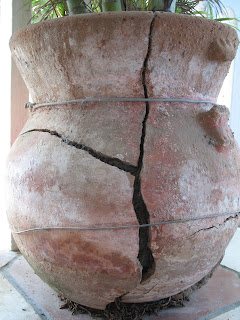These last few months I've had a taste of the kind of work life that suits me. And I'm scared, because something vital has become apparent:
I can no longer be someone I'm not.I can no longer look for my niche in the world by applying for permanent jobs. I can no longer seek my happiness in the next position, the next organization, thinking that
this will be the one I stay at;
this will be the one that makes me content.
I have followed that route for 30 years. And yes, I've had some wonderful experiences in the "permanent" jobs I have taken, but none of them lasted more than 4 years. In fact, most last two or less.
Truthfully, I get itchy after nine months.
I've spent much of my life in counseling trying to figure out why I couldn't settle down work wise and find a field to stick with. As a job's novelty wore thin, darkness and despair accompanied me regularly and I wondered, year after year, how to solve or escape these feelings. Many times I thought I was verging on madness, not knowing why I felt so trapped and defective. I could see that I wasn't cut out for the conventional work world, but I hadn't a clue, nor the inner resources, to address a solution.
When you are ready, shift happens.

I was re-reading
Refuse to Choose, by Barbara Sher. If you don't know Sher's work, check her out
here. She's a champion of self acceptance and goal achievement with several popular books to her credit.
Refuse to Choose is her most recent, and it addresses the special challenges and needs of those she calls Scanners – people who are interested in so many things they don't know which way to turn.
Though I didn't know what to do about it, I've always known I was a Scanner – that's nothing new. But in Sher's experience there are several types. Most of the type descriptions don't fit me well, and in years past I was discouraged by that fact. The last few chapters of her book, however, include a few types that I had never gotten around to reading about – or if I did, the words did not resonate. They now settled into my soul with a resounding "welcome home." It turns out Scanners of my particular ilk are not so much interested in mastery, or spending a lot of time with our "too many" interests. What we crave and
thrive on is learning for its own sake, random experience, dipping our toes in and then moving on to the next fascinating thing. We are happy beyond description about variety, change, and experiencing life differently every day. (I'm a combo Jack of All Trades, Wanderer, and Sampler, to use Sher's labels.)
Sher's "types" are her own invention, but that's ok with me. I've been reading enough about neurobiology and personality lately to be convinced that I'm hard wired in a way I cannot change. But even more importantly – and this is relatively "new" for me – I accept deeply that I shouldn't change. I am tired of trying to fit my round peg in the world's square holes. (Actually, I don't mind a few square holes for survival's sake, as with the latest economic shenanigans; it's fine as long as I know I can move on.)
Now that I am in a better place, psycho-spiritually, to move forward in a way that's more in tune with my strengths, gifts, and weaknesses, is it going to be easy? Probably not, but I have to ask: how easy has it been up until now?
The Gnostic Gospels say,
If you bring forth what is within you, what you bring forth will save you. If you do not bring forth what is within you, what you do not bring forth will destroy you.
These wise words bring up many questions regarding my quest for authenticity:
- Am I entitled to fashion my life in a way that makes me happy?
- Should I do this even if those close to me don't agree with my methods?
- Can I be true to myself in this or any economy?
- Can I also meet my obligations to my husband and our life together?
- Should I put my needs not just on par with his, but above his?
- If so, what are those needs?
- What do I want to do exactly?
So why am I scared? Because midlife feels like a life or death threshold for these choices, and I still don't have any real direction or answers, other than what I've stated above. Maybe that's the point, and the Wanderer/Sampler way: making it up as you go along. But at least now, I have genuine, heartfelt permission to do life my way, from the one who counts the most.


